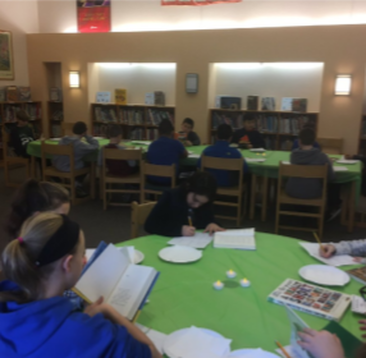When I arrived in North Andover, the district was in the early stages of resurrecting the elementary library program. The five elementary schools in the district had in the recent past been without library media specialists - books from the library were frequently rotated around each school by parent volunteers. More recently, the district had begun to hire one library media specialist to serve all five elementary schools. Unsurprisingly, this position was difficult to staff, as it required one person to travel to a new school each day of the week. I was hired to fill this recently-vacant position, and while I didn’t fully understand just how taxing the job would be, I did understand that it would require a lot of improvisational thinking.
After I was hired, it was shared with me that part of the reason for bringing me on board is that the school district was looking for some ‘out of the box’ thinking. Traditional librarianship wasn’t going to cut it; after years of library media specialists not working out, it was clear that a new model, and a new perspective, was needed. I was expected to be able to juggle all five schools and bring something new to the table.
I have found, in a district that has had a tumultuous relationship with librarians in the past, that the overwhelming feeling from classroom teachers is that the librarian isn’t any kind of a teaching partner. The expectation from many of them is that the librarian will read a thematic story to their classroom and then facilitate check-in and check-out. When faced with this attitude, I applied my improv tool of “yes, and” to help facilitate closer relationships with teachers. For example:
“Will you read a story about penguins to my class?”
“Yes, and I could also show them how to find more information using our school databases!”
Not only does this attitude demonstrate to teachers that you’re willing to go the extra mile to assist with the learning happening in their classrooms; it also is a form of advocacy. Many teachers in districts like North Andover don’t have much experience with the 21st century model of librarianship that library media specialists can offer. They don’t often ask for a librarian’s help because they don’t know a librarian is ready to offer help. Adding to ideas they mention to you is a way of advocating for all of the special skills that you as a library media specialist possess.
This “yes, and” attitude applies to the administration, as well. While North Andover is lucky enough to have a superintendent who is passionate about libraries, and who championed the library media specialists in our district, the principals that I worked directly under had less-than-positive experiences with librarians in the past. As someone with recent technology experience, I was able to say “yes, and” to a request to develop an online collaboration space for schools using Google; I was able to say “yes, and” to requests to use green-screen technology to enhance videos for school assemblies; I was able to say “yes, and” to giving presentations on current technology initiatives to all elementary classroom teachers in the district. All of these things are within the purview of a library media specialist working today, but few of the administrators I worked with were fully aware of that fact until I agreed to show them.
If we as library media specialists expand our understanding of our more traditional role within the school environment to include things like professional development for teachers, technology support in the classroom, and an overall willingness to add to ideas that teachers present us with, we’ll be able to implement positive change within our school libraries. The library space will no longer be simply a repository of books, but a hub for connection between teachers and the library media specialist. We as librarians can gently push the ideas of classroom teachers further, providing new and innovative ways of looking at shop-worn ideas. Through this attitude, of working with classroom teachers as one would a scene partner in improve, we can bring about positive change for our students both within and beyond the school library.
Dzula, Mark. “Strange Currency: Improv's ‘Yes, And’ as Tool for Collaboration.” Knowledge Quest, 13 Oct. 2016, knowledgequest.aasl.org/strange-currency-improvs-yes-tool-collaboration/.


